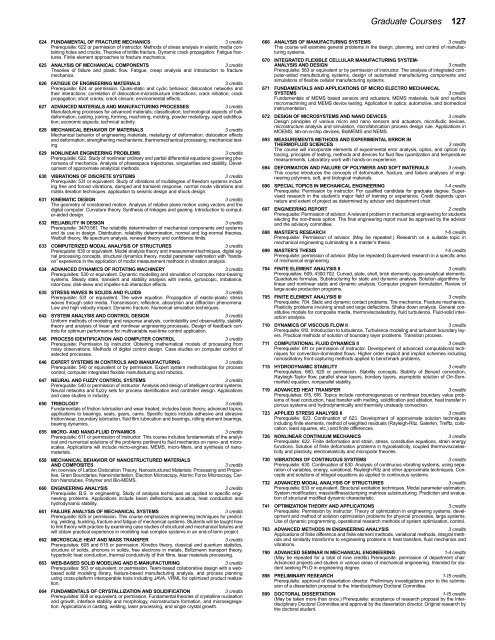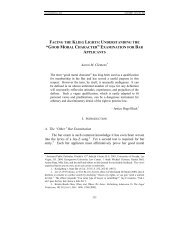2013-2014 GRADUATE BULLETIN - The University of Akron
2013-2014 GRADUATE BULLETIN - The University of Akron
2013-2014 GRADUATE BULLETIN - The University of Akron
Create successful ePaper yourself
Turn your PDF publications into a flip-book with our unique Google optimized e-Paper software.
Graduate Courses 127<br />
624 FUNDAMENTAL OF FRACTURE MECHANICS 3 credits<br />
Prerequisite: 622 or permission <strong>of</strong> instructor. Methods <strong>of</strong> stress analysis in elastic media containing<br />
holes and cracks. <strong>The</strong>ories <strong>of</strong> brittle fracture. Dynamic crack propagation. Fatigue fractures.<br />
Finite element approaches to fracture mechanics.<br />
625 ANALYSIS OF MECHANICAL COMPONENTS 3 credits<br />
<strong>The</strong>ories <strong>of</strong> failure and plastic flow. Fatigue, creep analysis and introduction to fracture<br />
mechanics.<br />
626 FATIGUE OF ENGINEERING MATERIALS 3 credits<br />
Prerequisite: 624 or permission. Quasi-static and cyclic behavior; dislocation networks and<br />
their interactions; correlation <strong>of</strong> dislocation-microstructure interactions; crack initiation; crack<br />
propagation; short cracks; crack closure; environmental effects.<br />
627 ADVANCED MATERIALS AND MANUFACTURING PROCESSES 3 credits<br />
Manufacturing processes for advanced materials; classification; technological aspects <strong>of</strong> bulk<br />
deformation, casting, joining, forming, machining, molding, powder metallurgy, rapid solidification;<br />
economic aspects; technical activity.<br />
628 MECHANICAL BEHAVIOR OF MATERIALS 3 credits<br />
Mechanical behavior <strong>of</strong> engineering materials; metallurgy <strong>of</strong> deformation; dislocation effects<br />
and deformation; strengthening mechanisms; thermomechanical processing; mechanical testing.<br />
629 NONLINEAR ENGINEERING PROBLEMS 3 credits<br />
Prerequisite: 622. Study <strong>of</strong> nonlinear ordinary and partial differential equations governing phenomena<br />
<strong>of</strong> mechanics. Analysis <strong>of</strong> phasespace trajectories, singularities and stability. Development<br />
<strong>of</strong> approximate analytical methods.<br />
630 VIBRATIONS OF DISCRETE SYSTEMS 3 credits<br />
Prerequisite: 531 or equivalent. Study <strong>of</strong> vibrations <strong>of</strong> multidegree <strong>of</strong> freedom systems including<br />
free and forced vibrations, damped and transient response, normal mode vibrations and<br />
matrix iteration techniques. application to seismic design and shock design.<br />
631 KINEMATIC DESIGN 3 credits<br />
<strong>The</strong> geometry <strong>of</strong> constrained motion. Analysis <strong>of</strong> relative plane motion using vectors and the<br />
digital computer. Curvature theory. Synthesis <strong>of</strong> linkages and gearing. Introduction to computer-aided<br />
design.<br />
632 RELIABILITY IN DESIGN 3 credits<br />
Prerequisite: 3470:561. <strong>The</strong> reliability determination <strong>of</strong> mechanical components and systems<br />
and its use in design. Distribution, reliability determination, normal and log-normal theories,<br />
Weibull theory, life spectrum analysis, renewal theory and confidence limits.<br />
633 COMPUTERIZED MODAL ANALYSIS OF STRUCTURES 3 credits<br />
Prerequisite: 630 or equivalent. Modal analysis theory and measurement techniques, digital signal<br />
processing concepts, structural dynamics theory, modal parameter estimation with “handson”<br />
experience in the application <strong>of</strong> modal measurement methods in vibration analysis.<br />
634 ADVANCED DYNAMICS OF ROTATING MACHINERY 3 credits<br />
Prerequisites: 530 or equivalent. Dynamic modelling and simulation <strong>of</strong> complex rotor-bearing<br />
systems. Steady state, transient and stability analysis with inertia, gyroscopic, imbalance,<br />
rotor-bow, disk-skew and impeller-rub interaction effects.<br />
635 STRESS WAVES IN SOLIDS AND FLUIDS 3 credits<br />
Prerequisite: 531 or equivalent. <strong>The</strong> wave equation. Propagation <strong>of</strong> elastic-plastic stress<br />
waves through solid media. Transmission, reflection, absorption and diffraction phenomena.<br />
Low and high velocity impact. Dynamic fracture. Numerical simulation techniques.<br />
642 SYSTEM ANALYSIS AND CONTROL DESIGN 3 credits<br />
Uniform methods <strong>of</strong> modeling and response analysis, controlability and observability, stability<br />
theory and analysis <strong>of</strong> linear and nonlinear engineering processes. Design <strong>of</strong> feedback controls<br />
for optimum performance for multivariable real-time control application.<br />
645 PROCESS IDENTIFICATION AND COMPUTER CONTROL 3 credits<br />
Prerequisite: Permission by instructor. Obtaining mathematical models <strong>of</strong> processing from<br />
noisy observations. Methods <strong>of</strong> digital control design. Case studies on computer control <strong>of</strong><br />
selected processes.<br />
646 EXPERT SYSTEMS IN CONTROLS AND MANUFACTURING 3 credits<br />
Prerequisite: 540 or equivalent or by permission. Expert system methodologies for process<br />
control, computer integrated flexible manufacturing and robotics.<br />
647 NEURAL AND FUZZY CONTROL SYSTEMS 3 credits<br />
Prerequisite: 540 or permission <strong>of</strong> instructor. Analysis and design <strong>of</strong> intelligent control systems.<br />
Neural networks and fuzzy sets for process identification and controller design. Applications<br />
and case studies in industry.<br />
650 TRIBOLOGY 3 credits<br />
Fundamentals <strong>of</strong> friction lubrication and wear treated; includes basic theory, advanced topics,<br />
applications to bearings, seals, gears, cams. Specific topics include adhesive and abrasive<br />
friction/wear, boundary lubrication, fluid film lubrication and bearings, rolling element bearings,<br />
bearing dynamics.<br />
655 MICRO- AND NANO-FLUID DYNAMICS 3 credits<br />
Prerequisite: 611 or permission <strong>of</strong> instructor. This course includes fundamentals <strong>of</strong> the analytical<br />
and numerical solutions <strong>of</strong> the problems pertinent to fluid mechanics on nano- and microscales.<br />
Applications will include micro-engines, MEMS, micro-filters, and synthesis <strong>of</strong> nanomaterials.<br />
658 MECHANICAL BEHAVIOR OF NANOSTRUCTURED MATERIALS<br />
AND COMPOSITES<br />
3 credits<br />
An overview <strong>of</strong> Lattice Dislocation <strong>The</strong>ory, Nanostructured Materials: Processing and Properties,<br />
Grain Boundaries, Nanoindentation, Electron Microscopy, Atomic Force Microscopy, Carbon<br />
Nanotubes, Polymer and Bio-MEMS.<br />
660 ENGINEERING ANALYSIS 3 credits<br />
Prerequisite: B.S. in engineering. Study <strong>of</strong> analysis techniques as applied to specific engineering<br />
problems. Applications include beam deflections, acoustics, heat conduction and<br />
hydrodynamic stability.<br />
661 FAILURE ANALYSIS OF MECHANICAL SYSTEMS 3 credits<br />
Prerequisite: 625 or permission. This course emphasizes engineering techniques for predicting,<br />
yielding, buckling, fracture and fatigue <strong>of</strong> mechanical systems. Students will be taught how<br />
to link theory with practice by examining case studies <strong>of</strong> structural and mechanical failures and<br />
will obtain practical experience in modeling real complex systems in an end-<strong>of</strong>-term project.<br />
662 MICROSCALE HEAT AND MASS TRANSFER 3 credits<br />
Prerequisites: 608 and 615 or permission. Kinetics theory, classical and quantum statistics,<br />
structure <strong>of</strong> solids, phonons in solids, free electrons in metals, Boltzmann transport theory,<br />
hyperbolic heat conduction, thermal conductivity <strong>of</strong> thin films, laser materials processing.<br />
663 WEB-BASED SOLID MODELING AND E-MANUFACTURING 3 credits<br />
Prerequisites: 563 or equivalent, or permission. Team-based collaborative design with a webbased<br />
solid modeling library, feature-based manufacturing analysis, and process planning<br />
using cross-platform interoperable tools including JAVA, VRML for optimized product realization.<br />
664 FUNDAMENTALS OF CRYSTALLIZATION AND SOLIDIFICATION 3 credits<br />
Prerequisites: 608 or equivalent, or permission. Fundamental theories <strong>of</strong> crystalline nucleation<br />
and growth, interface stability and morphology, microstructure formation, and microsegregation.<br />
Applications in casting, welding, laser processing, and single crystal growth.<br />
666 ANALYSIS OF MANUFACTURING SYSTEMS 3 credits<br />
This course will examine general problems in the design, planning, and control <strong>of</strong> manufacturing<br />
systems.<br />
670 INTEGRATED FLEXIBLE CELLULAR MANUFACTURING SYSTEM-<br />
ANALYSIS AND DESIGN<br />
3 credits<br />
Prerequisite: 563 or equivalent or by permission <strong>of</strong> instructor. <strong>The</strong> analysis <strong>of</strong> integrated computer-aided<br />
manufacturing systems, design <strong>of</strong> automated manufacturing components and<br />
simulations <strong>of</strong> flexible cellular manufacturing systems.<br />
671 FUNDAMENTALS AND APPLICATIONS OF MICRO ELECTRO MECHANICAL<br />
SYSTEMS<br />
3 credits<br />
Fundamentals <strong>of</strong> MEMS based sensors and actuators, MEMS materials, bulk and surface<br />
micromachining and MEMS device testing. Application in optics, automotive, and biomedical<br />
instrumentation.<br />
672 DESIGN OF MICROSYSTEMS AND NANO DEVICES 3 credits<br />
Design principles <strong>of</strong> various micro and nano sensors and actuators, micr<strong>of</strong>ludic devices,<br />
microstructure analysis and simulation, micr<strong>of</strong>abrication process design rule. Applications in<br />
MOEMS, lab-on-a-chip devices, BioMEMS and NEMS.<br />
693 MEASUREMENTS METHODS AND EXPERIMENTAL ERROR IN<br />
THERMOFLUID SCIENCES<br />
3 credits<br />
<strong>The</strong> course will incorporate elements <strong>of</strong> experimental error analysis, optics, and optical ray<br />
tracing, principles <strong>of</strong> testing, methods and devices for fluid flow quantization and temperature<br />
measurements. Laboratory work with hands-on experience.<br />
694 DEFORMATION AND FAILURE OF POLYMERS AND SOFT MATERIALS 3 credits<br />
This course introduces the concepts <strong>of</strong> deformation, fracture, and failure analyses <strong>of</strong> engineering<br />
polymers, s<strong>of</strong>t, and biological materials.<br />
696 SPECIAL TOPICS IN MECHANICAL ENGINEERING 1-4 credits<br />
Prerequisite: Permission by instructor. For qualified candidate for graduate degree. Supervised<br />
research in the student’s major field <strong>of</strong> training or experience. Credit depends upon<br />
nature and extent <strong>of</strong> project as determined by advisor and department chair.<br />
697 ENGINEERING REPORT 2 credits<br />
Prerequisite: Permission <strong>of</strong> advisor. A relevant problem in mechanical engineering for students<br />
electing the non-thesis option. <strong>The</strong> final engineering report must be approved by the advisor<br />
and the advisory committee.<br />
698 MASTER’S RESEARCH 1-6 credits<br />
Prerequisite: Permission <strong>of</strong> advisor. (May be repeated.) Research on a suitable topic in<br />
mechanical engineering culminating in a master’s thesis.<br />
699 MASTER’S THESIS 1-6 credits<br />
Prerequisite: permission <strong>of</strong> advisor. (May be repeated) Supervised research in a specific area<br />
<strong>of</strong> mechanical engineering.<br />
704 FINITE ELEMENT ANALYSIS II 3 credits<br />
Prerequisites: 609, 4300:702. Curved, plate, shell, brick elements; quasi-analytical elements.<br />
Quadrature formulas. Substructuring for static and dynamic analysis. Solution algorithms for<br />
linear and nonlinear static and dynamic analysis. Computer program formulation. Review <strong>of</strong><br />
large-scale production programs.<br />
705 FINITE ELEMENT ANALYSIS III 3 credits<br />
Prerequisite: 704. Static and dynamic contact problems. Tire mechanics. Fracture mechanics.<br />
Plasticity problems involving small and large deflections. Shake down analysis. General constitutive<br />
models for composite media, thermoviscoelasticity, fluid turbulence. Fluid-solid interaction<br />
analysis.<br />
710 DYNAMICS OF VISCOUS FLOW II 3 credits<br />
Prerequisite: 610. Introduction to turbulence. Turbulence modeling and turbulent boundary layers.<br />
Practical methods <strong>of</strong> solution <strong>of</strong> boundary layer problems. Transition process.<br />
711 COMPUTATIONAL FLUID DYNAMICS II 3 credits<br />
Prerequisite: 611 or permission <strong>of</strong> instructor. Development <strong>of</strong> advanced computational techniques<br />
for convection-dominated flows. Higher order explicit and implicit schemes including<br />
nonoscillatory front-capturing methods applied to benchmark problems.<br />
715 HYDRODYNAMIC STABILITY 3 credits<br />
Prerequisites: 660, 620 or permission. Stability concepts, Stability <strong>of</strong> Benard convection,<br />
Rayleigh-Taylor flow, parallel shear layers, bondary layers, asymptotic solution <strong>of</strong> Orr-Sommerfeld<br />
equation, nonparallel stability.<br />
719 ADVANCED HEAT TRANSFER 3 credits<br />
Prerequisites: 615, 616. Topics include nonhomogeneous or nonlinear boundary value problems<br />
<strong>of</strong> heat conduction, heat transfer with melting, solidification and ablation, heat transfer in<br />
porous systems and hydrodynamically and thermally unsteady convection.<br />
723 APPLIED STRESS ANALYSIS II 3 credits<br />
Prerequisite: 623. Continuation <strong>of</strong> 623. Development <strong>of</strong> approximate solution techniques<br />
including finite elements, method <strong>of</strong> weighted residuals (Rayleigh-Ritz, Galerkin, Trefftz, collocation,<br />
least squares, etc.) and finite differences.<br />
726 NONLINEAR CONTINUUM MECHANICS 3 credits<br />
Prerequisite: 622. Finite deformation and strain, stress, constitutive equations, strain energy<br />
functions. Solution <strong>of</strong> finite deformation problems in hypoelasticity, coupled thermoviscoelasticity<br />
and plasticity, electroelasticity and micropolar theories.<br />
730 VIBRATIONS OF CONTINUOUS SYSTEMS 3 credits<br />
Prerequisite: 630. Continuation <strong>of</strong> 630. Analysis <strong>of</strong> continuous vibrating systems, using separation<br />
<strong>of</strong> variables, energy, variational, Rayleigh-Ritz and other approximate techniques. Concepts<br />
and solutions <strong>of</strong> integral equations as applied to continuous systems.<br />
732 ADVANCED MODAL ANALYSIS OF STRUCTURES 3 credits<br />
Prerequisite: 633 or equivalent. Structural excitation techniques. Modal parameter estimation.<br />
System modification; mass/stiffness/dumping matrices substructuring. Prediction and evaluation<br />
<strong>of</strong> structural modified dynamic characteristic.<br />
741 OPTIMIZATION THEORY AND APPLICATIONS 3 credits<br />
Prerequisite: Permission by instructor. <strong>The</strong>ory <strong>of</strong> optimization in engineering systems, development<br />
and method <strong>of</strong> solution optimization problems for physical processes, large systems.<br />
Use <strong>of</strong> dynamic programming, operational research methods <strong>of</strong> system optimization, control.<br />
763 ADVANCED METHODS IN ENGINEERING ANALYSIS 3 credits<br />
Applications <strong>of</strong> finite difference and finite element methods, variational methods, integral methods<br />
and similarity transforms to engineering problems in heat transfers, fluid mechanics and<br />
vibrations.<br />
790 ADVANCED SEMINAR IN MECHANICAL ENGINEERING 1-4 credits<br />
(May be repeated for a total <strong>of</strong> nine credits) Prerequisite: permission <strong>of</strong> department chair.<br />
Advanced projects and studies in various areas <strong>of</strong> mechanical engineering. Intended for student<br />
seeking Ph.D in engineering degree.<br />
898 PRELIMINARY RESEARCH 1-15 credits<br />
Prerequisite: approval <strong>of</strong> dissertation director. Preliminary investigations prior to the submission<br />
<strong>of</strong> a dissertation proposal to the Interdisciplinary Doctoral Committee.<br />
899 DOCTORAL DISSERTATION 1-15 credits<br />
(May be taken more than once.) Prerequisite: acceptance <strong>of</strong> research proposal by the Interdisciplinary<br />
Doctoral Committee and approval by the dissertation director. Original research by<br />
the doctoral student.

















